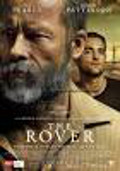
Directed by
David Michod
102 minutes
Rated MA
Reviewed by
Chris Thompson

The Rover
Synopsis: Outback Australia; ten years after society’s collapse. Eric’s a loner on the trail of three men who stole his car. Along the way he encounters Rey, the brother of one of the car thieves, left for dead after an unexplained bloody encounter with the militia. Eric forces Rey to take him to the where his brother was headed. Along the way we discover the desperate lengths people will go to in order to survive in this broken down world where the rule of law has all but vanished and individual lives have little or no value.
What hope is there for us? Not a whole lot if David Michôd’s new film, The Rover, is anything to go by. Judging by the familiarity of the few man-made objects in the otherwise bleak and empty landscape, the unspecified ‘collapse’ referred to in the film’s opening title is not that far off. But now it’s ten years later and Guy Pearce, plays, for all intents and purposes, a man with no name, with a singular and determined focus on a seemingly simple mission. He wants his car back.
Pearce give us a coiled and intense character, a man of a few words who, quite early in the story, commits an act that leaves us in no doubt as to his uncompromising ruthlessness.The internalised damage and intensity that Pearce brings to his performance is, perhaps, nothing new or surprising to us (Mad Max provides a ready precedent), but Michôd exploits this to good effect through his lean and often opaque screenplay. What is surprising is the level to which Robert Pattinson as Rey is able to match Pearce in a story that is largely a two hander. When he’s not saddled with banal and wooden dialogue and the need to look like a sexy vampire, as was the case in the Twilight movies, it turns out that Pattinson is a pretty good actor. His simple-minded but manipulative character elicits a kind of pitying sympathy as the two men develop a tenuous bond.
Late in the film, in an exchange with a militia officer, played with steely disinterest by Anthony Hayes, Pearce’s Eric (we only know his name from the end credits) gives us a rare glimpse into his past and what brought him to where he is now. He speaks about a crime he committed and the fact that, in this post-collapse world, no-one seemed interested in bringing him to justice. His sense of despair at a world that no longer metes out consequences for immoral actions seems to lie at the heart of what drives him and perhaps, even, at the heart of what the film is about.
Michôd and cinematographer Natasha Braier find a kind of terrible beauty in the desolate exteriors, the decaying ghost towns and the squalid interiors in the story is set. Underscoring the imagery is a visceral, evocative soundscape by Sam Petty that very effectively intertwines with the music by Antony Partos. Petty’s aggressive, metallic sounds create a jagged atmospheric edge that works hand in hand with the subtler but more disturbing naturalistic sounds of desperation, pain and violence that seem to encroach from the periphery of every scene.
Whilst much of the success of the film is owed to the two central performances, there are numerous smaller roles that punctuate this dystopian road trip. The standout for me is a scene-stealer from Gillian Jones as the eccentric Grandma who might be able to tell Eric which way the car thieves went. She manages to bring a chilling malevolence to this otherwise sweet little old lady with her knitting who just wants a name to call him by.
It’s inevitable that The Rover will be seen through the lens of being a follow up to Michôd’s startling first film, Animal Kingdom. But The Rover deserves to be viewed in its own right. It’s a gruelling journey for characters and audience alike. It’s stark, violent and nihilistic with a real assuredness in the sparseness of its screenplay and how little it chooses to tell us about what has come before, why people do what they do, and what it’s really all about. I can’t help but admire a film that refuses to spoon-feed me with backstory and motivation and demands my engagement if I want to find meaning in it. That’s why, for me, the final scene is so disappointing. Obviously I don’t want to give it away, suffice to say that it feels like the level of storytelling confidence that permeates the rest of the film wasn’t strong enough to resist the temptation of giving us some sort of final revelation.

Want more about this film?


Want something different?




